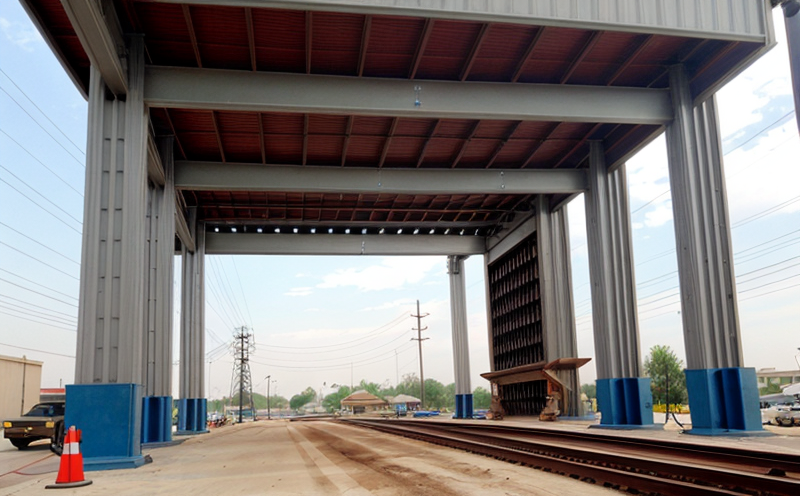EN 6072 Thermal Fatigue Testing of Aircraft Components
The EN 6072 standard is a critical component within aerospace and aviation testing frameworks. This standard specifies thermal fatigue testing methods for aircraft components, focusing on materials that are exposed to high-temperature gradients during service. The primary goal of this testing method is to evaluate the resistance of these materials and structures against repeated temperature cycling, which simulates real-world operational conditions.
Thermal fatigue can cause significant damage to materials used in critical aircraft systems such as turbine blades, engine components, and avionics housings. By subjecting specimens to rapid heating and cooling cycles, EN 6072 thermal fatigue testing helps identify potential weaknesses or failures that could lead to catastrophic failure under actual operating conditions.
The process involves precise control over temperature changes, often ranging from room temperature up to temperatures exceeding 1000°C. Specimens are subjected to multiple cycles of heating and cooling at specific rates, depending on the material type and its expected service environment. This method ensures that any flaws or weaknesses in the component structure become apparent before they could lead to operational issues.
For materials like titanium alloys and advanced composite structures, which form the backbone of modern aircraft designs, EN 6072 testing provides a robust means to assess their durability under extreme thermal conditions. The standard also covers the use of various specimen geometries, including flat plates, tubes, and complex assemblies, making it adaptable to diverse component types.
The acceptance criteria for EN 6072 testing are stringent, ensuring that only components meeting rigorous standards pass inspection. Acceptance is based on both visual inspections and non-destructive evaluation techniques such as ultrasonic testing or radiography. These methods help detect internal defects that may not be visible to the naked eye.
Understanding the importance of thermal fatigue testing in aerospace ensures that manufacturers and operators can rely on tested components for safe, reliable operation. This testing plays a crucial role in maintaining airworthiness by preventing failures due to material degradation caused by thermal cycling.
| Parameter | Description |
|---|---|
| Temperature Range | Typically from room temperature to over 1000°C. |
| Cycling Rate | Defined by the specific material and application needs. |
| Number of Cycles | Varies based on specimen type and expected service life. |
| Environmental Conditions | Incorporates both temperature and, if applicable, pressure variations. |
Why It Matters
The significance of EN 6072 thermal fatigue testing cannot be overstated in the aerospace industry. The potential consequences of material failure due to thermal cycling are severe and could lead to accidents, delays, and increased maintenance costs. By adhering to this standard, manufacturers ensure that their products meet stringent safety requirements set by aviation authorities worldwide.
Thermal fatigue tests also contribute to ongoing research and development efforts aimed at improving the performance and longevity of aerospace components. Through these tests, engineers can identify areas for material improvements or design adjustments that enhance structural integrity and operational efficiency.
Moreover, compliance with EN 6072 is a prerequisite for certification by aviation authorities such as the FAA (Federal Aviation Administration) in the United States and EASA (European Union Aviation Safety Agency). This ensures that aircraft components are safe and reliable, meeting international standards of quality and safety.
The aerospace sector relies heavily on advanced materials and innovative designs. EN 6072 testing supports this innovation by providing a standardized method to evaluate new materials and component designs before they enter manufacturing processes. This helps in reducing development time and costs while ensuring that every part meets the highest standards of quality and safety.
In summary, thermal fatigue testing is an essential tool for maintaining the integrity and reliability of aerospace components under extreme environmental conditions. It plays a vital role in safeguarding lives by ensuring that aircraft systems are dependable and safe.
Eurolab Advantages
EuroLab offers comprehensive EN 6072 thermal fatigue testing services tailored to the unique needs of the aerospace industry. Our state-of-the-art facilities provide a controlled environment where we can replicate real-world operational conditions accurately.
- ISO/IEC 17025 Accreditation: Ensures that our laboratory adheres to international standards for testing and calibration services.
- Experienced Engineers: Our team comprises experts with extensive experience in aerospace materials and testing methods.
- Advanced Equipment: Utilizing the latest equipment, we can conduct precise tests that meet stringent acceptance criteria.
- Comprehensive Reporting: We deliver detailed reports that include all test parameters, results, and recommendations for improvement or further testing.
EuroLab's commitment to quality and reliability is reflected in our consistent adherence to international standards. Our services are designed to help clients achieve compliance with aviation authorities while ensuring the safety and performance of their products.
Use Cases and Application Examples
| Aircraft Component Type | Testing Objective |
|---|---|
| Turbine Blades | Evaluation of material integrity under high-temperature cycles. |
| Engine Compressors | Detection of thermal fatigue-induced cracks and defects. |
| Housings | Assessment of structural integrity in extreme temperature environments. |
- Turbine blades, critical for generating the necessary power to drive aircraft engines. These components experience intense thermal stress during operation and must withstand repeated cycles of heating and cooling without failure.
- Engine compressors, which compress air before it enters the combustion chamber. The materials used in these components must be able to maintain their strength under high-temperature conditions for extended periods.
- Housings, essential for enclosing various engine parts. These structures need to withstand extreme thermal gradients and mechanical stresses, making them prime candidates for EN 6072 testing.





